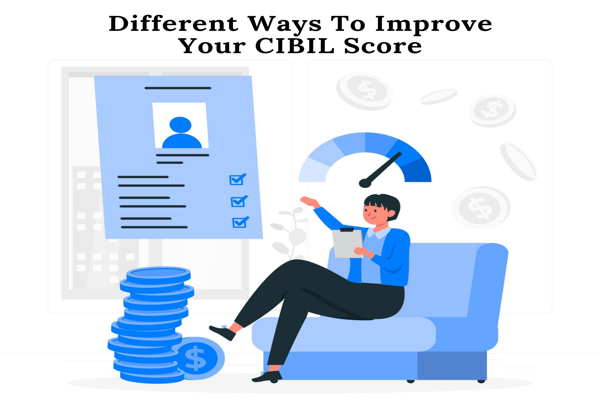One can obtain a credit report from any of the four credit bureaus in India, and one of such bureaus is CIBIL. Your CIBIL score is a representation of your creditworthiness. Financial institutions consult before extending loans or other credit-based services to help meet your financial goals. Most financial institutions now categorize borrowers by their credit scores and base interest rates on the level of risk involved in providing the loan. An interest rate's inverse relationship with riskiness is also genuine: the lesser the risk, the lower the rate.
How is Your CIBIL Score Calculated?
Your payment history, length of payment history, credit applications, credit amount, debt mix, etc., all factor into your CIBIL Score. The relative importance of these considerations varies. Maintaining a high score requires constant attention.
What Can You Do to Raise Your CIBIL Score Quickly?
The possible CIBIL Score is between 300 and 900. Generally, a score of 300-549 is considered below average, while a score of 550-700 is considered to be average. One's ability to get a loan is aided by having a high CIBIL score, but the converse is also true.
Getting a personal loan requires a CIBIL score of 700 or higher. Any score under 700 might be cause for alarm. Nonetheless, there is yet hope. Your CIBIL score won't improve overnight, but minor changes to your spending and saving habits can significantly improve your bad CIBIL score.
1. Repayment of Credit Card dues on time
Those with credit card debts but have yet to pay them off can see their scores rise. It may be possible to avoid late payment fees by getting into the habit of paying only the minimum amount due each month, as shown on the credit card statement. This minimum payment is around 5% of the total for the current billing cycle. However, interest and taxes are added to the bill in the following cycle, resulting in a substantial increase in the overall debt load.
Avoiding late fees and increasing your credit rating are two benefits of paying bills on time.
2. Limit Credit Utilization
Avoiding above 30% utilization can help protect your credit score. However, a low credit score results from never using your credit card. Therefore, prepaying your credit card bill is a good idea. If your credit card usage is nearing or exceeding 30%, you may consider increasing your credit limit to enhance your credit score. It is also wise to apply for a small number of loans. Multiple loan applications damage credit scores.
3. Choose Various Forms of Credit
A lower CIBIL score makes it more difficult to obtain loans. Thus it's in your best interest to build your credit history. It is best to have a diverse range of credit, including unsecured and secured loans and long and short-term loans, to strengthen your credit. If and when you decide to apply for a loan, this move can increase your chances of receiving a larger loan at a cheaper interest rate.
4. Raise Your Credit Limits
If your credit limit is raised, your credit utilization ratio will fall, and your credit score will rise. You will be labeled a high-risk borrower if you consistently use more than 30% of your available credit. Utilizing 100% of your available credit (or more) raises your credit utilization ratio and the associated default risks. Your credit will take a hit even if the dangers just slightly affect you.
Consequently, before making any new purchases, you should raise your credit limit. You may improve your credit score by exercising responsible credit management and keeping your credit utilization minimum.
5. It's wise to keep a record of past due payments
Lenders grant loans depending on applicants' credit histories, represented by their credit scores.
Therefore, it is in your best interest to preserve the details of your previous successful loan application on file with the credit bureaus. After all, paying back debt by the terms and within the agreed-upon time frame improves your credit score and makes you a more attractive borrower.
One additional strategy to boost your Score is to prolong your accounts' use with solid payment history. Most businesses rely on this strategy, making it the most frequent one. To improve their FICO score, they opt to keep their credit card active for as long as feasible.
6. Don't Apply for Multiple New Credit Lines
Credit limits can be increased by opening a new line of credit, but be aware that doing so will result in a hard inquiry being added to your credit report. A hard inquiry is an in-depth review of your credit history that lenders use to determine your risk as a borrower.
With each hard inquiry appearing on your credit report for the next two years, it's easy to see how quickly a decline in your Score might occur if you make several in a short period. The rejection of a loan application due to rigorous investigation is a devastating event.
7. Be Patient and Persistent in Your Approach
Fixing errors on one's credit record and raising one's credit score takes time and work.
You'll need to be patient and keep an eye on your credit report, accounts, and payments until you see positive changes. But, in the long run, it will help you become more creditworthy and have a higher credit score.
Improving your CIBIL Score is challenging, but it is possible with preparation and dedication.










.png)



3 Comments
You've provided quite good information here. This is fantastic since it expands our knowledge and is also beneficial to us. Thank you for sharing this piece of writing. Read more info about Business Loans for Small Business
ReplyDeleteWow! Thanks so much for this post. This information has been very helpful thanks for sharing this post.
ReplyDeletehttps://discountagent.co.uk/
Great post! I really enjoyed reading your insights on this topic. It's clear that you put a lot of effort into researching and writing this article.
ReplyDeletepelisplus.lat